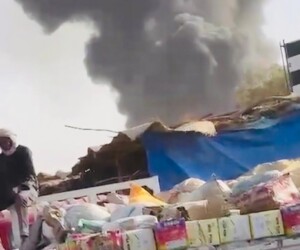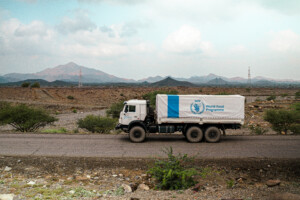Sudan: Fighting in Blue Nile state capital, demos call for governor’s dismissal
24/10/2022 10:46 ED DAMAZIN / WAD EL MAHI / EL ROSEIRESAs the situation in Blue Nile state deteriorates due to outbreaks of violence, demonstrators calling for the dismissal of Governor Ahmed El Omda burned the buildings of the Secretariat of the state government in Ed Damazin, capital of Blue Nile state, on Sunday.
 Hausa people fleeing El Roseires town after the eruption of tribal violence in Blue Nile state on July 16 (File photo: Sudan Tribune)
Hausa people fleeing El Roseires town after the eruption of tribal violence in Blue Nile state on July 16 (File photo: Sudan Tribune)
As the situation in Blue Nile state deteriorates due to outbreaks of violence, demonstrators calling for the dismissal of Governor Ahmed El Omda burned the buildings of the Secretariat of the state government in Ed Damazin, capital of Blue Nile state, on Sunday.
Sources from Ed Damazin told Radio Dabanga that shootings took place at the city’s market and the Rabee neighbourhood on Sunday evening, in which at least one person was killed and multiple others injured. El Funj tribesmen raided an army depot of the garrison in the city and stole weapons.
Demonstrations broke out after the two-day deadline passed to respond to demands set by the demonstrators. The sources said that the demonstrators are also demanding the cancellation of the October 2020 Juba Peace Agreement, as the agreement has no popular support, and is considered to be concocted by the Sudan Armed Forces, the Rapid Support Forces militia, and the rebel movements who backed the October 2021 coup d’etat.
In Wad El Mahi, near El Roseires in Blue Nile state, inter-communal violence renewed on October 13. “As fighting continues, at least 1,200 people have been displaced and an unconfirmed 170 people have been killed and 327 have been injured”, UN Office for the Coordination of Humanitarian Affairs (OCHA) in Sudan wrote in its latest update.
The clashes started south of El Roseires in mid-July when indigenous El Funj, El Hamaj, and in particular Berta tribesmen attacked Hausa families in the area. The violence was allegedly triggered by the decision of Malik Agar, member of the Sovereignty Council, to enter Hausa* leaders in Blue Nile state into the Native Administration system, in order to gain more support in the region, which he lost by installing relatives of his from the small Engassana tribe on government posts and in his Sudan People’s Liberation Movement-North (SPLM-N Agar) faction. Governor El Omda is a nephew of Agar.
198 dead and 200 wounded
The Blue Nile state government reported on Saturday that the number of victims as a result of the tribal clashes in Wad El Mahi has reached 198 people, and more than 200 wounded, with the displacement of a large number of people.
Ezzeldin Adam Suleiman, Director of the Ministry of Social Welfare and Head of the High Emergency Committee in the Blue Nile state, told Radio Dabanga that the authorities have not been able to count the victims in Medina 3 and Medina 4 in the Wad El Mahi governorate so far.
As a result of the fighting, a large number of people have been displaced inside and outside the area of Wad El Mahi, according to Suleiman, who noted that approximately 15,000 people have arrived in El Roseires.
He said that the conditions in the hospitals exceed the capabilities of the Blue Nile state Ministry of Health, and indicated that the available food and shelter aid does not cover what is needed.
In an interview with Radio Dabanga last week, Suleiman confirmed the authenticity of images circulated on social media regarding the burned and charred bodies, stating that “a large number of homes were burned during the clashes”.
Deteriorating humanitarian situation
The Humanitarian Aid Commission in the Blue Nile state reported that the authorities have not been able to bury the burned bodies or remove the injured from Medina 4 so far.
Ramadan Yasin, Commissioner for Humanitarian Aid in the region, told Radio Dabanga that the number of deaths that have been counted so far in Medina 4 in Wad El Mahi governorate has reached 157, and the number of wounded in Medina 4 is 98.
He pointed out that the dead in Medina 3 were not counted because the security forces have not been able to enter it so far.
“The governor of Wad El Mahi, Abdelaziz El Amin, was shot at in Medina 4 while trying to bury the bodies, which led to his return to his office in the town,” said Yasin.
He deplored the burning of people including children, the elderly, and pregnant women inside their homes, and referred to the deteriorating humanitarian situation in conflict areas. Some of the wounded were evacuated to Ed Damazin Teaching Hospital and El Shafee Health Centre.
17,153 families (85,765 people) have been displaced as a result of the clashes that took place last week in Wad El Mahi governorate in 10 areas, including El Azaza, Guneis Sharg and Medina 5, 6, and 12, according to the commissioner.
Critical humanitarian conditions are being faced by those who fled the tribal clashes and sought refuge in schools in Guneis Sharg and El Roseires, reported the El Roseires Emergency Room.
Ehab Babiker, from the El Roseiris Emergency Room, told Radio Dabanga on Sunday that four schools in Guneis Sharg are completely overcrowded with displaced people, including some who walked for two days to reach the hospital.
He said that there is an urgent need for food and shelter, especially tarpaulins, mosquito nets, blankets, and household appliances, and the establishment of temporary clinics in Guneis and El Roseires to treat the many wounded.
State of Emergency
El Omda declared a 30-day state of emergency in Blue Nile state in a press conference on Saturday. He directed the commander of the Sudanese army’s 4th Infantry Division, the local police commander, intelligence services, and the Rapid Support Forces to restore the “state’s prestige”.
The Director-General of the Ministry of Health in Blue Nile state, Fata El Rahman Bakheet, said that the authorities are unable to count the number of victims and wounded due to the bad security situation, which he described as “very bad” on Saturday. He also called on the government in Khartoum to intervene urgently in order to calm the situation.
The violence that erupted in mid-July between El Funj, Berta, El Hamaj, and Hausa in the northern part of Blue Nile state left at least 105 people dead and caused thousands to flee to the state’s capital Ed Damazin and safe parts of El Roseires, flared up in September as well. At least 24 people were killed as the violence resurfaced. At least 149 people died before October 6, according to OCHA.
* The Hausa ethnic group is politically and culturally very influential in West Africa. In the process of travelling and trading for centuries, a number of them migrated east to places like Sudan – where they are still seen by many as outsiders.











 and then
and then